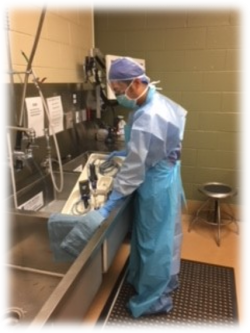
This is an open-ended question designed to weed out those technicians that are just looking for a paycheck. “Why did you apply for this position?” or “Why did you apply at our hospital/center?” You always want to highlight your experience on this question, and the preparation that has led you to this interview. If you are certified, make sure to mention that, and if you are taking classes for sterile processing certification, make sure you mention that. Just give them your name, and a brief history of your background. They have your resume already, so this question is more about what kind of person and worker you will be. This is almost always the first question of the interview. If you can keep these in mind as you prepare for the interview, and also during the interview, you will ace every question. Is this applicant going to be here for the long term?.Is this applicant going to fit in with my team?.Is this applicant going to be able to handle the stress of the job?.Is this applicant a good person and a good worker?.The questions below are accurate to what you will likely hear in your interview, but the real things most managers want to find out are:

You’ve earned your way into this interview, so be confident! What hiring managers are really looking for Always stay positive, remember to breathe, and try to be at your best. I’m just really excited about the opportunity to work here.” Now you’ve explained your anxiety or nerves with a positive spin. Say something like, “Sorry, I’m a little nervous. During the interview, if your nerves do get the best of you and you become flustered, don’t worry about it. Take deep breaths before heading into the room, close your eyes, and try to focus on calming your nerves.

I personally have anxiety anytime I head into any meeting or in-service where I am required to speak, and especially during interviews. If you are nervous, don’t worry! Hiring managers don’t necessarily grade you down for nervousness. Here you will find the most common sterile processing job interview questions likely to be posed to candidates during an interview, and how you should prepare to respond to each one. I have personally interviewed hundreds of potential candidates over the years and the same questions have come up time after time. Sterile processing technicians are a vital part of any medical team, ensuring that instruments, exam rooms, operating rooms and more are clean, sterile environments in order to prevent contamination and infection.First of all, congratulations! Getting ready for an interview with Sterile Processing Department leadership can be a daunting prospect, especially if it’s your first time interviewing for SPD jobs, but it’s no small feat to get your foot in that door. From there, you’ll register and sit for your certification exam. How long does it take to become a sterile processing technician?ĭepending on your schedule and pace, you can complete our online sterile processing program in as little as a few months. Upon passing the exam, you can call yourself a certified sterile processing technician and add your credentials to your resume. How do I become certified as a sterile processing technician?Īfter completing your sterile processing education, you’ll register and sit for the Certified Registered Central Service Technician Exam. Many sterile processing technicians work alongside physicians and surgeons, registered nurses, and other healthcare workers at hospitals, outpatient care centers, physicians’ offices, and other medical facilities.

Sterile processing technicians are essential to the maintenance, storage, distribution, and sterilization of medical instruments. Where can I work as a sterile processing technician? Our online programs are flexible enough for you to finish them at a pace that works for you, based on how much time you can dedicate to your coursework each week.Graduates are eligible to sit for the Certified Registered Central Service Technician (CRCST) Certification exam offered by the Healthcare Sterile Processing Association (HSPA), the cost of which is covered in the program tuition.Online sterile processing technician training courses cover topics such as the duties and requirements of sterile processing technicians, fundamental practices and procedures for aseptic technique, HIPAA privacy regulations, and more.Can prepare students for an entry-level career as a sterile processing technician.Through flexible, self-paced courses, you'll learn the fundamental skills and knowledge to become a sterile processing technician on your schedule, from home. If you're detail-oriented and interested in playing a vital role in healthcare, our online Sterile Processing Technician Career Diploma Program can help you prepare to take the first steps toward the job you want.


 0 kommentar(er)
0 kommentar(er)
